|
TRANSLATE THIS ARTICLE
Integral World: Exploring Theories of Everything
An independent forum for a critical discussion of the integral philosophy of Ken Wilber
SEE MORE ESSAYS WRITTEN BY FRANK VISSER
REACHING OUT
TO THE WORLD
Years of Application and Assessment
A New Online Chapter of
Ken Wilber: Thought as Passion
Frank Visser
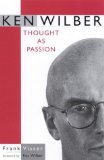 Note: This new chapter, witten at the request of my Chinese publisher (Beijing Spirit and Freedom), will be slightly different from the previous ones in my book Ken Wilber: Thought as Passion (SUNY Press, 2003), which were book-by-book descriptions. Not only has Wilber written very few original books in the past decade,[1] but I have distanced myself from the integral scene due to events that will be described later on in this chapter. Rather, I will focus more on foundational issues with Integral Theory (i.e. Wilberian integral theory) and summarize some of my concerns with Integral Theory which I have expressed over the years on Integral World.
Note: This new chapter, witten at the request of my Chinese publisher (Beijing Spirit and Freedom), will be slightly different from the previous ones in my book Ken Wilber: Thought as Passion (SUNY Press, 2003), which were book-by-book descriptions. Not only has Wilber written very few original books in the past decade,[1] but I have distanced myself from the integral scene due to events that will be described later on in this chapter. Rather, I will focus more on foundational issues with Integral Theory (i.e. Wilberian integral theory) and summarize some of my concerns with Integral Theory which I have expressed over the years on Integral World.
THE INTEGRAL LANDSCAPE: INSTITUTIONS AND INITIATIVES
How could Wilberian integral philosophy prove its worth in the arena of professional science and philosophy?
After the founding of Integral Institute[2] in 1998 the time seemed ripe to consolidate the work done by Wilber in the past decades in an institution that could offer its insights to the world at large. Funding did not seem to be a big problem at the time, for Wilber managed to interest an Internet millionaire in his work and plans.[3] The sky was the limit in the dotcom boom of 2000, and many plans were launched to bring integral philosophy out into the world, such as the funding integral research, the publication of integral books or perhaps even the inauguration of an integral Nobel Prize. Several branches of Integral Institute were opened, in which Integral Theory was applied to fields of science or society: integral politics, integral medicine, integral education, integral ecology, integral art, integral spirituality and so on. “Integral” quickly became a brand name.
Expectations were high, but when the Internet bubble burst around 2000,[4] all these plans had to be readjusted. The idea back then was to invite specialists from the various academic fields and collectively produce major textbooks that could introduce integral concepts into the world of academia, to facilitate acceptance in that area. This turned out to be too ambitious a project, for none of these volumes could be realized.[5] Apparently, Wilber was still the only one capable of making the case for academic relevance for his integral philosophy. Science, however, is predominantly a collective effort, and one's claims for truth should always be corroborated by the efforts of fellow scientists. As Wilber's philosophy of science would phrase it: truth is decided among a community of the adequate.
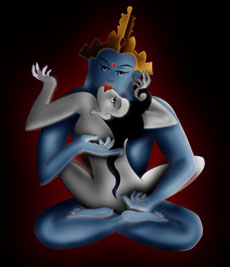 Imagery from Integral Naked
Imagery from Integral Naked
Integral Institute produced many offshoot organizations and initiatives, which were subsumed under the idea of a Multiplex,[6] a website released in 2006.[7] In this integral universe several constellations were founded: an Integral Education Network, Integral Naked, Integral Spiritual Center, Integral Training, Integral University and Integral Coaching & Consulting. For many years the paysite Integral Naked would function as an online platform for various forms of infotainment, packaging integral ideas for a larger audience, involving Wilber's phone call interviews with celebrities from the fields of New Age, science, art or Hollywood. In 2007 this umbrella function was transferred to Integral Life,[8] “a social media hub documenting the rise of a unique 21st century renaissance occurring amongst visionary leaders, scientists, thinkers and artists around the world.” Integral University, an online platform which would include many departments covering the many fields of science where integral philosophy could be applied, never materialized, though the project was in progress for years. For some years an academic integral programme was offered at JFK University near San Francisco, but this was terminated due to a change in its administration. Several smaller academic institutions stepped in to continue this integral education. Efforts were started to teach integral concepts to those new to the field, which resulted in the online training courses produced by Core Integral. The MetaIntegral Foundation was started to cast a wider integral net, to include other integral luminaries besides Wilber.[9]
Two major challenges seemed to loom large on the horizon: how could Wilberian integral philosophy prove its worth in the arena of professional science and philosophy (and spirituality for that matter)? And, how would it respond to the inevitable criticism it would receive? Would it open itself up to this challenge? These areas are intimately and dynamically related: the truth of a theory is not decided on in isolation, but in a confrontation with either competing theories or paradigms or the challenges of real life problems. But where the application of Integral Theory to personal or world problems is based on the assumption of the correctness of its major tenets, a true academic approach would not hesitate to question this very correctness head-on.
THE INTEGRAL MESSAGE FOR A WORLD ON FIRE
It wouldn't take long for the world to provide a perfect case study or even test case for the relevance of Integral Theory.
It wouldn't take long for the world to provide a perfect case study or even test case for the relevance of Integral Theory where it comes to global politics, the clash of cultures and the impact of religion. When the two airplanes struck the World Trade Center on 9/11, 2001, every major and minor think tank, journalist or layman gave his opinion as to what actually happened in this dramatic assault. Was the Western world under attack from a pre-modern religion trying to gain world dominance? Was the hegemony of our economic system of capitalism at stake?[10]
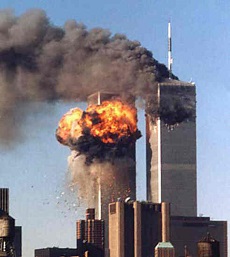 An iconic 9/11 photo
An iconic 9/11 photo
Wilber had just finished the manuscript of his Boomeritis (2002) novel and was still working in fiction-mode when he decided to write a 91-page “essay” on 9/11 using the fictitious characters from that novel to clarify possible responses to this world-shaking event.[11] This made for lively reading but cast doubt on the wisdom of Wilber's strategy to get his ideas across to the proper audience that could benefit from integral ideas but was unwilling to spend too much time on studying it. Which mainstream policy maker or political consultant would bother going through the musings of students and teachers of a fictitious Integral Center (obviously modeled after the real Integral Institute)? Why not write a Letter to the Editor of The New York Times to get the attention of this larger audience? In the ensuing years, no publication on integral politics—a subject always high on Wilber's list—from integral quarters was issued that would force those in charge to take a serious look at integral concepts.
It actually would get worse. Around 2007 Wilber published a few chapters on his website taken from a work in progress, a trilogy on terrorism called The Many Faces of Terrorism.[12] Again, the style was that of a fiction novel, which would put off most of the intended audience. The trilogy would never see the light of day. It was a missed chance for integral philosophy of truly global proportions. Wilber had managed to become irrelevant for this discussion.
What readers of these online integral reflections on 9/11 could take home is that according to Wilber one's response to this catastrophe would depend entirely on one's stage of development. A pre-modern, mythic-religious believer would see it as a righteous attack on a decadent Western culture which worships materialism and hedonism. A modernist would get worried about the stability of the global economic world order, and a postmodernist would stress the fact that this revenge from Islamic countries was due to decades of oppression by military dictatorships, supported by oil-hungry Western countries.[13] Wilber even ventured a spiritual-mystical response to this crisis situation, which amounted to the question: “What crisis?”
When the first Iraq War broke out in 2003, many of Wilber's students, including me, urged him to respond to this situation, and he complied reluctantly by writing an email, claiming, among other things, that an Integral World Federation was in order, and that those protesting against the war were dangerously close to being Saddam enablers and Tony Blair was the most integral of world leaders. The email ended with the following sentiment that the world was not yet ready for integral:
unfortunately, the world needs integral action. unfortunately, it will not get it, whether we go to war or not. still, better to light one candle than curse the darkness. so we work on ourselves and attempt to increase our own integral consciousness to some degree each day, so that in the end we leave the world just a little bit more whole than we found it...[ 14] (lower case in the original)
Again, this seems a miscalculation to me, given the fact that an integral analysis of this complex and explosive world situation would be helpful in orienting policy makers to a solution that would have the best chance of lasting success. Was there ever a better opportunity to prove to the world that integral philosophy was more than an individualistic approach to spirituality and higher states of consciousness?[15] These responses from Wilber met with criticism from various Integral World authors, who accused him of a lack of understanding of global politics and a naive belief that going to war on the basis of a neo-conservative agenda, itself far from integral, would change the world for the better.[16] “It takes a BLUE meme [absolutive thinking, Bush] to smash RED [exploitative egocentrism, Saddam] in the face and not blink”, Wilber commented in another email communication posted on Integral World,[17] implicitly, and rather irresponsibly, endorsing the US going to war—with grave and uncertain consequences.
THE “I'M O.K, YOU'RE NOT O.K” CORRAL
As one commentator observed, this episode had done more damage to Wilber's reputation as an aspiring academic, than any criticism he had ever received.
Around the founding of Integral Institute in 1998 Wilber asked me to play a role in it by collecting as much of the online criticism available at the time, so he could reflect and respond to it in a structured way.[17a] (The role was named "DA" which could mean Devil's Advocate or Distric Attorney). However, at that time, detailed criticism related to Wilber's ideas was extremely rare, both in print and online, and only after 2000 did sustained reflection on integral concepts become available, primarily by spontaneous submissions to Integral World by various authors.[18] Currently, as of 2014, this website contains over 1.000 essays on aspects of integral philosophy and/or Ken Wilber and provides a forum for discussion of all things integral in a non-promotional and non-commercial setting.
Wilber's attitude towards these Integral World criticisms has always been defensive and lukewarm. He often claimed to be misrepresented by these authors, though he never substantiated this claim, and chose to ignore this body of work altogether. Since the critical writings kept piling up, and a whole monograph on Wilber's Integral Theory (Bald Ambition: A Critique of Ken Wilber's Theory of Everything) written by Jeff Meyerhoff[19]—covering, contrary to most if not all extant critiques, a wide spectrum of the various fields of developmental psychology, western history, poststructuralism and postmodernism, mysticism, and methodology—was serialized on Integral World, Wilber could no longer ignore it. Meyerhoff argued convincingly that Wilber had grossly overstated the academic consensus he claimed for his Theory of Everything.
To give just one example from many of the type of criticism available on Integral World. Wilber claims to have successfully integrated the insights from postmodernism into his integral model. However, Gregory Desilet, a professional postmodernist philosopher thought otherwise. In the essay "Misunderstanding Derrida and postmodernism" submitted to Integral World in 2007 he stated, after carefully comparing Wilber's statements about Derrida and Derrida's own writings: “Wilber's reading is a bad misreading. In fact, it is a misreading that twists what Derrida says into its opposite” and “Despite his sophistication, Wilber appears to have missed the point of deconstructive postmodernism.”[20] This raises questions about the trustworthiness of Wilber as a reporter on science and philosophy. At the minimum it calls for a closer study of Wilber's writings. This questioning is legitimate and appropriate, and requires an atmosphere of open debate.
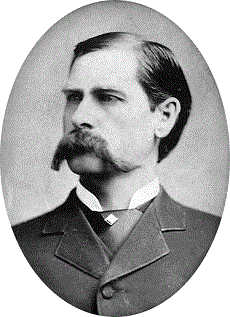 Wyatt Earp (1848-1929)
Wyatt Earp (1848-1929)
In several infamous blog postings in 2006,[21] in which he pictured himself as Wyatt Earp,[22] the famous American deputy gunfighter who shot some outlaw cowboys at a location called the O.K Corral, Wilber attacked these Integral World efforts in no uncertain terms, the most graphic being “suck my dick”.[23] Wilber showed a contempt for his critics, unparalleled in the intellectual world. As one commentator observed, this episode had done more damage to Wilber's reputation as an aspiring academic, than any criticism he had ever received. What is more, it turned out in a later blog posting that his tirade was not an emotional (and some would say understandable) outburst but deliberately staged to test his audience. Those who were offended by the rough language and imagery used were not yet ready for integral, whereas those who could appreciate it were welcome to enter Wilber's integral sanctuary. Emails from his closest students full of glowing support for Wilber's extravagant behavior were posted as follow-ups in subsequent days, to prove that at least his closest students understood his message. For me the magic was gone, totally. Ken Wilber had lost most of the credit he had—and believe me, he had a lot.
One online commentator perceptively remarked after all the dust had settled:
Having just read Jeff Meyerhoff’s rebuttal to Wyatt Erpy on Integral World, “INTELLECTUAL TRAGEDY”, I’m quite surprised, frankly. The dunderheaded Neanderthal Meyerhoff, as I was lead to expect by Erpy, turns out to be quite reasonable, cogent, pithy, and well balanced in his presentation. In fact, I’d have to say, if I’d never heard of either of them before, and “simply” read the entire Erpy blog series and this one response by Meyerhoff, I’d mistake Meyerhoff for the world famous philosopher, and Wilber for the unbalanced critic.[23a]
Again, this deliberate strategy of ignoring, attacking and ridiculing criticism, even if only online and written by independent students of his writings, can be questioned as to its effectiveness. In a situation where any substantial consideration from mainstream academic science was virtually absent, any attempt to put Wilber's ideas into some perspective or wider context should have been welcomed. Instead, future exchanges were aborted by this event, and I could not help seeing this as an attempt by Wilber to avoid confronting deep conceptual issues presented by his theories.
“Games pandits play” was the title of one of my personal responses to this digital attack, paraphrasing the famous self-help book Games People Play by Eric Berne. People play games to avoid threatening situations, and pandits are no exception. One wonders if Wilber's self-disclosure, taken from Grace and Grit, was true in this case as well:
In my case, when I become afraid, when fear overcomes me, my ordinary lightness of outlook, which generously might be referred to as wit, degenerates into sarcasm and snideness, a biting bitterness towards those around me—not because I am snide by nature, but because I am afraid.[ 23b]
Or to paraphrase another popular self-help book, I'm OK, You're OK by Thomas Harris, and with a hint at Wilber's preference for Wild West metaphors, this was a shootout between Wilber and his online critics at the “I'm OK, you're not OK Corral.”[24]
The attack was unfair, undeserved and uncalled-for. If this was a case of integral abuse, it also showed the typical bystander apathy, for nobody from the integral community stood up in public against Wilber's behavior to be counted. This episode also showed that Wilber was unable to hold the various criticisms aired on Integral World spaciously enough to comment on it where needed, and to appreciate where it raised pertinent questions. Is this what meditation does to you? Isn't this what meditation actually is supposed to do: to hold things in your mind without being affected by them? Here again, in my opinion, this has been a missed opportunity to freely reflect on integral concepts with the goal of helping find internal inconsistencies or wider implications not yet covered by Wilber's own writings.
Since then, various efforts have been made to introduce the Wilberian integral approach to the world of academia, by founding an academic journal, the Journal of Integral Theory and Practice, and organizing integral conferences, which have been held in 2008, 2010 and 2013 near San Francisco (a first European Integral Conference was held in Budapest in 2014). In recent years, efforts have been made to compare and contrast Wilber with other integral thinkers, such as Roy Bhaskar and Edgar Morin (this was the explicit theme of the 2013 conference). I applaud these efforts for only by comparing and contrasting Wilber with his integral peers will any possible shortcomings of his model be more easily spotted. It remains to be seen if these developments open Wilberian integral philosophy up to wider horizons or if Wilber decides to solely focus on his own model. During the 2014 conference he announced in a video connection he would resume writing about the “serious problems” present in Bhaskar's philosophy—so it seems that the second option is more likely to happen.
KEN WILBER'S “EROTIC UNIVERSE”
Though Wilber may be strong in the fields of mind and culture, his coverage of the domains of life and matter leaves much to be desired.
Much has been made of Wilber's “post-metaphysical” phase or Wilber-5. It all started more or less in 2001, when I did an interview with Wilber together with Edith Zundel, about the metaphysical implications of Wilber's model.[25] A German author had recently published the article “Transpersonal system speculation”[26] in a German transpersonal magazine, in which he criticized Wilber for introducing metaphysics in his psychological theories. Wilber, remember, often wrote in his earlier works about the Great Chain of Being including matter, body, mind, soul and Spirit, which according to him defined the evolutionary trajectory which both human beings and cultures undergo in their march to Enlightenment. This all sounds very metaphysical indeed. Wilber, however, declared in the interview that was a response to this article (and indirectly to Habermas' Post-Metaphysical Thinking, 1994) that his current writing was thoroughly post-metaphysical, purely based on evidence and experience and not on any metaphysical speculation.
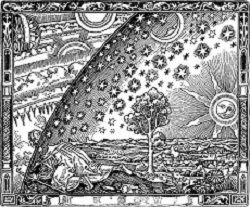 Flammarions Holzstich, Paris 1888:
Flammarions Holzstich, Paris 1888:
Die Mechanik des Kosmos
Contrary to the traditional perennialist view of higher worlds or dimensions which supposedly exist independently of our own human consciousness—a view I have believed in for many years myself, I even wrote the book Seven Spheres[27] about it—Wilber's take is more modern and therefore psychological. In his post-metaphysical view, he sees all reality as stage-dependent. Pre-modern man lived in a different reality from ours, and so will future mankind see other realities. It's not that science has finally found "reality", where pre-modern man still lived in his fantasy mythical worldview. According to Wilber, our scientific worldview is as much stage-specific as any other. This has led some observers to believe that Wilber's new Wilber-5 model needs more "grounding in reality" (e.g. within the circle of Bhaskar's Critical Realism[28]), but Wilber has denied this charge.[29] For Wilber, reality—or rather realities in plural—is or are always implicated in any stage of consciousness and cannot be divorced from it. Metaphysical worlds independent of consciousness have become psychological “worldspaces” embedded in consciousness. Some would call this progress, some would see it as an impoverishment.
This gives Wilber-5 an idealistic tone, in the philosophical meaning of the term, which those of a more realistic bent would want to correct. But already in Integral Psychology (2000) we find the sentence: “You can make essentially the same points using only the levels of consciousness (since being and knowing are two sides of the same levels)”.[30] Perhaps it's more accurate to say that our knowledge of the world is stage-dependent, but not reality itself (this is the epistemology/ontology debate best left to professional philosophers[30a]). On the other hand, what else do we have except our knowledge? Do atoms exist? Or only within some 20th century theory of physics? Some philosophical homework is in order for Wilber, if you ask me. It is indeed high time that Ken Wilber fleshes out his philosophical position.
Though his newer line of thinking might have jettisoned most of the more crude metaphysical notions about higher levels of being implicit in his earlier work, some metaphysical residue still remains.[31] Most notably among these elements is the notion of an “Eros in the Kosmos,” Wilber's favorite name for Spirit. In Wilber's vision, our journey from simple matter to complex conscious beings and cultures is driven by Eros.
From the 2001 German interview:
...this gradient or morphogenetic field is the self-organizing capacity of the Kosmos—Eros by any other name.[ 32]
In Integral Spirituality (2006) he states:
That drive—Eros by any other name—seems a perfectly realistic conclusion, given the facts of evolution as we understand them. Let's just say there is plenty of room for a Kosmos of Eros.[ 33]
This can be considered the core of Wilber's philosophy—more central than holons, heaps, or artifacts; quadrants, levels, lines, states and all that jazz—not only the process of biological evolution, but the cosmos as a whole, is governed by a mysterious spiritual Force. Apparently, for Wilber, there is no other way to explain nature's complexities. He is inspired in this respect by A.N. Whitehead's process philosophy, which postulates an immanent divine force in evolution.[34]
While I have defended similar notions in the past, and have even criticized Wilber for misrepresenting the esoteric view of evolution[35] which postulates a divine upward drive towards complexity, after years of studying the field of biological evolution I would no longer hold that view. On the contrary, I discovered that science has offered many plausible explanations for the existence of cosmological and biological complexity. This makes the postulation of a spiritual Eros in the Kosmos rather premature. So instead of challenging Wilber from the perennialist position, which I did in my earlier writings, over the years I have challenged him on Integral World from the naturalistic position of science.[36] Let's really get post-metaphysical. Let's get physical![37] Though Wilber may be strong in the fields of mind and culture, his coverage of the domains of life and matter leaves much to be desired. This casts grave doubts on Wilber's claim for a Theory of Everything.
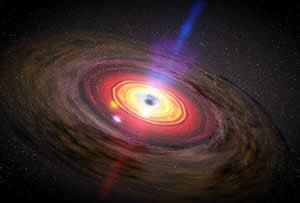 An "erotic" universe driven by Spirit?
An "erotic" universe driven by Spirit?
In Wilber's “erotic” universe, the choice is between a universe that is governed by chance, and one that is driven by Spirit. No third alternative is possible here. That's why he can claim that all the elements we know of—Hydrogen, Carbon, Phosphor, Magnesium, Lead, Uranium, etc. (there are 118 in total, of which some exist freely in nature and some have been synthesized by us artificially)[38]— have been produced by a mysterious force of Spirit.[39] For how else can these magnificent complexities have come about? Who would have expected the complexities of nature to have happened at all at the start of the Big Bang? Isn't this mysterious? As Wilber would phrase it rhetorically: how did dirt get up and write poetry? Well, science has a plausible story of how this is possible. Stellar explosions called super novae have produced these heavier elements in the cosmic past, enriching the dust from which our Sun and planets have been formed. Gravity is indeed the single most important factor here. For it is this very force of gravity that has set up the cosmic gradient between super-hot stars and ultra-cool space—gravity makes everything in the cosmos possible.[40]
But this is not exactly the spiritual Eros-gradient Ken Wilber has in mind! For Wilber, all complexity in the cosmos is in the end the result of a mysterious force of Eros. For science, following the dictates of the four laws of thermodynamics, it is the result of purely naturalistic processes, where order is gained at the expense of much disorder (in the form of heat or low-level energy). We live on small islands of order in a wide ocean of disorder. Here's a field of study integral students still have to explore.[40a] Entropy is where the action is! So we have two explanatory schemes: Wilber believes in a cosmic force of Eros which creates all complexity, and science which sees complexity as a local phenomenon happening in a cooling and expanding universe, without which order wouldn't have been possible at all.[41]
A RELIGIOUS VIEW OF UNIVERSAL EVOLUTION
The problem with Wilber is that he argues for a religious view of universal evolution, by misrepresenting the accomplishments reached by science in this field.
As for biological evolution, this is a deep subject, which I have tried to cover on Integral World for many years. When in 2009 the publication of Darwin's The Origin of Species was celebrated, the time seemed ripe for a comparison between Wilber's take on biological evolution and that of biological science.[42] Surprisingly, and disappointingly, this has not received a lot of attention from integral students. Wilber's rather exotic view of evolution is taken for granted (and relished), even if it turns out to be way out of touch with the scientific literature. Again, for Wilber, the scientific explanation of evolutionary complexity amounts to an irrational belief in chance. But read any elementary book on evolution and you will find that science doesn't believe in chance alone. Says Richard Dawkins: “It is grindingly, creakingly, crashingly obvious that, if Darwinism were really a theory of chance, it couldn't work.”[43] In the scientific view, the combined efforts of chance and natural selection, make biological complexity possible (if only because not just anything gets selected randomly, only that which is fit enough to survive). Now I am not saying that Richard Dawkins is the last word on evolution, but he is definitely the first word. And Wilber has consistently misspelled these elements of evolutionary theory.
 A Panamian golden toad
A Panamian golden toad
The crucial distinction between the scientific and the religious-integral view of evolution is: if there is no spiritual force driving evolution upwards towards higher complexity, the problem becomes to explain why anything evolves at all. Why haven't bacteria remained the only creatures on Earth?[44] In my opinion, science goes a long way in accomplishing this. But if there is a transcendental drive towards complexity, the opposite problem poses itself: why doesn't everything evolve? After all, there are still reptiles, amphibians, fish and of course bacteria. Is Eros not strong enough to push every species onward and upward, does it perhaps have its special preferences? And why does it not work on other planets of our Solar System except our Earth? Or can it work only under certain conditions? These questions are, of course, theological and remain therefore forever outside the boundaries of science. The problem with Wilber's take on evolution is that he argues for and promotes an essentially religious view of universal evolution, by misrepresenting the accomplishments reached by science in this field.[45]
Taking the widest possible look at life and the universe, scientific opinion ranges across the whole spectrum from “life is a freak accident” to “life is inevitable”, and “we are the expected”. Spiritual authors add to this that, if life is so improbable, it can only have been created, or in the case of Wilber, been “aided” by an Eros in the Kosmos. However, if one wants to promote such a philosophy of emergence-backed-by-Spirit, it is good to know this is a minority view, and not the “largely agreed-upon orienting generalizations” Wilber has claimed to have simply collected.[45a]
In his most popular work A Brief History of Everything, Wilber makes a similar argument in the context of cosmological evolution:
[S]omething other than chance is pushing the universe. For traditional scientists, chance was their god. Chance would explain it all. Chance—plus unending time—would produce the universe. But they don't have unending time, and so their god fails them miserably. That god is dead. Chance is not what explains the universe; in fact, chance is what that universe is laboring mightily to overcome. Chance is exactly what the self-transcending drive of the Kosmos overcomes.[ 46]
Here again, the opposition of chance versus a mysterious spiritual drive of Eros is a false dichotomy.
Here again, the opposition of chance versus a mysterious spiritual drive of Eros is a false dichotomy. “Chance would explain it all” is a misrepresentation of the efforts of science, which speak of chance and necessity, randomness and determinism. Equating evolution with chance is a sure sign of misunderstanding the whole concept.[47] What is more, a whole superstructure of “evolutionary spirituality” has been built by Wilber and his collaborators (Andrew Cohen, Marc Gafni, Terry Patten) upon these shaky foundations of ill-understood science. This is not even an irony, it is a travesty.[47a] Ironically the term “evolutionary” is replacing “integral” increasingly as a new brand name in integral circles. So where one was first going to an integral therapist, these days an evolutionary therapist is recommended! (This has nothing to do with the academic school of evolutionary psychology.) An elaborate integral scholastic system has been erected on this foundation, which includes horizontal and vertical enlightenment, the Wilber-Combs Matrix (suggesting the independence of states of consciousness and stages of development), and even the existence of states-stages, implying a quasi stage-like process of mystical states of consciousness.
A DIFFERENTIAL APPROACH
 Jacob Peter Gowy's The Flight of Icarus.
Jacob Peter Gowy's The Flight of Icarus.
We leave that for another time. But one example can convey the flavor of Wilber-5. In Integral Spirituality[48] Wilber makes a distinction between horizontal enlightenment (the classical notion of enlightenment, in Wilber's definition: being one with all states) and vertical enlightenment (being one with all stages, a new integral concept). This implies that realized individuals of the past cannot equal the depth of modern-day spiritual realization, because we moderns are more developed in terms of Wilber's model. Elías Capriles,[49] professor of Eastern Studies in Mérida, Venezuela, who has a deep knowledge of the Eastern Tibetan traditions, commented in an analysis of Wilber-5: “It seems to me an outrageous expression of modern hubris to believe that one who becomes Awake today has a better or more complete realization than one who became Awake 6000 years ago.”[50] Indeed, perhaps this hubris is the most salient characteristic of the various integral endeavors of the past decade. Integral institutions are very good at bragging about their own excellence—I call this integral inflation.[51]
Many students of Ken Wilber are not well versed in the scientific literature of physics and biology, since most are psychologists, therapists, consultants or meditators, so very few will spot these deeper problems with the Wilberian integral model. But as long as these problems remain unexamined Integral Theory cannot claim to be a Theory of Everything.[52] Truth be told, a Theory of Everything from physics, if it will ever be found, would still not be able to explain higher level phenomena of mind and culture. Wilber's TOE would therefore be promising if it would get clear on its relationship to the hard sciences. It would therefore be strongly advisable if Integral Theory as a discipline joins forces with kindred or complementary fields such as that of Big History, which also aspires to a Theory of Everything, but with much more grounding in the material and energetic dimensions of science (though much less sophisticated in the fields of mind and culture).[53]
The proper approach to Wilber's integral philosophy is therefore differential: some parts of it are strong, some are weak and some are just plain wrong. Above all, let's de-glamorize, de-hype, de-mystify, de-idealize the integral project.[54] Only in such a climate can we sort out what's valuable and what isn't. The current strongly commercialized and even evangelical (“spread the message to as many people as possible!”) integral culture makes this sober reflection virtually impossible and even suspect.[55]
I think it is fair to say that though we have seen many initiatives and applications of Integral Theory in the past decade, its assessment as to its credibility in all domains of existence (matter, life, mind and culture) is still waiting to be accomplished.
REFERENCES
[1] In fact, Wilber published only Integral Spirituality (2006) and the ebook The Fourth Turning (2014). Other books were anthologies (The Simple Feeling of Being, 2004, and The Pocket Ken Wilber, 2008), an illustrated abridgment (The Integral Vision, 2007) or a co-authored volume (Integral Life Practice, 2008). Wilber also produced several lengthy online writings, presented as "Excerpts" from his yet to be released volume 2 of the Kosmos-trilogy. In this chapter we will not go into a detailed description of these online and offline writings.
[2] Wikipedia, “Integral Institute,” http://en.wikipedia.org/wiki/Integral_Institute
[3] Joe Firmage, an Internet entrepreneur, Web visionary, and former CEO of USWeb, http://en.wikipedia.org/wiki/Joe_Firmage
[4] Wikipedia, “Dot-com bubble,” http://en.wikipedia.org/wiki/Dot-com_bubble
[5] What came close to this original plan is: S. Esbjörn-Hargens and M. Zimmerman, Integral Ecology, Shambhala/Integral Books, 2009.
[6] Multiplex, http://www.kenwilber.com/multiplex/list
[7] “Integral Institute Announces the Launch of the Multiplex! Become a Member Today!”, June 16, 2006, http://www.kenwilber.com/blog/show/71
[8] https://www.integrallife.com/about
[9] https://metaintegral.org/
[10] Or was it a conspiracy of US administrators to provide a pretense to attack Iraq? David Ray Griffin, a philosopher admired by Wilber for his work on the mind-body problem and Whitehead, would turn out to claim exactly that in a dozen books published between 2004-2011, http://en.wikipedia.org/wiki/David_Ray_Griffin
[11] “The Deconstruction of the World Trade Center: A Date That Will Live in a Sliding Chain of Signifiers”, Wilber.shambhala.com, 2001, reposted on kenwilber.com in 2006 with Introduction, http://www.kenwilber.com/Writings/PDF/WTC.pdf
[12] See: http://www.kenwilber.com/Writings/
[13] See: Bill Moyer, The “Missing Links” of Spiral Dynamics and Ken Wilber, 2002, http://www.integralworld.net/mgm.html
[14] “The War in Iraq”, email communication, March 23, 2003, posted on Integral World, http://www.integralworld.net/iraq2.html
[15] See also: Gregory Wilpert, “Towards an Integral Analysis of the Iraq Crisis”, 2003, http://www.integralworld.net/wilpert3.html
[16] See: Ray Harris, “Integral Analysis of the Iraq War”, http://www.integralworld.net/harris11.html, 2003; Mark Edwards, “The War on Terror”, 2004, http://www.integralworld.net/edwards21.html , Jose Vergara, “Integral Blair?”, http://www.integralworld.net/vergara.html, 2007. See also R. Carlson, “Integral Ideology”, 2008, http://www.integralworld.net/carlson.html
[17] Ken Wilber, “On the Mean Memes in General”, 2002, http://www.integralworld.net/mgm2.html
[17a] I was even contracted by Shambhala to function as co-editor for the projected volume Kindred Spirits, which would feature a collection of essays favorable of Wilber by leading transpersonal or spiritual authors (as well as a summary of the main critiques of Wilber's theory available at that time). This volume was never published. It would have been Wilber's response to Ken Wilber in Dialogue (1998), an earlier anthology of views critical of Wilber's model.
[18] Most notably Ray Harris, Mark Edwards and Andy Smith, all of which contributed about 30 long essays in various integral topics. They were later joined by David Lane, Elliot Benjamin, Joe Corbett, Alan Kazlev, Hugh Martin, Jeff Meyerhoff, Giorgio Piacenza, Geoffrey Falk and many others. All of this work has been largely ignored by Wilber.
[19] Jeff Meyerhoff, Bald Ambition: A Critique of Ken Wilber's Theory of Everything, serialized on Integral World between 2005-2007 and a few years later published as hard-cover (Inside the Curtain Press, 2010).
[20] “Misunderstanding Derrida and postmodernism”, 2007, http://www.integralworld.net/desilet.html
[21] Ken Wilber, “What We Are, That We See”, 2006, http://www.kenwilber.com/blog/show/46
[22] “Wyatt Earp”, http://en.wikipedia.org/wiki/Wyatt_Earp. Marshall Earp reached legendary status during his life, though “the Wyatt Earp to be found in some current works is more devoted to protecting property and power than to justice”, Richard E. Nicolls, "Long May His Stor Be Told", http://www.nytimes.com, April 18, 1999.
[23] See for an overview of these blog postings, their follow up postings and responses: Frank Visser, “The Wild West Wilber Report”, 2006, http://www.integralworld.net/visser15.html
[23a] Colmar, "Intellectual Tragedy", July 12, 2006, http://colmar3000.blogspot.nl/2006/07/intellectual-tragedy.html. A reference is made to Jeff Meyerhoff, "Intellectual Tragedy", 2006, www.integralworld.net
[23b] Wilber, Grace & Grit, 1991, p.152. Quoted in: Jeff Meyerhoff, Bald Ambition, p. 242. Also posted online: "Psychological Analysis of Wilber's Beliefs", www.integralworld.net
[24] This humorous phrase is from Brian van der Horst.
[25] Ken Wilber, “On the Nature of a Post-Metaphysical Spirituality: A Response to Habermas and Weis, 2001. http://www.kenwilber.com/Writings/PDF/ ResponsetoHabermasandWeis_CRITICS_2003.pdf
[26] Weiss, Hans-Willi, Ken Wilbers Transpersonale Systemspekulation: Eine kritische Auseinandersetzung, in Transpersonale Psychologie und Psychotherapie, 2001, 2, 2001.
[27] See for example the chapter “Spheres Upon Spheres”, http://www.integralworld.net/visser-ss-03.html
[28] http://en.wikipedia.org/wiki/Roy_Bhaskar
[29] Ken Wilber, “Response to Critical Realism in Defense of Integral Theory”, 2013, https://www.integrallife.com/integral-post/response-critical-realism-defense-integral-theory
[30] Ken Wilber, Integral Psychology, 2000, p. 237.
[30a] A good place to start is: Sean Hargens, "Wilber and Bhaskar Begin an Important Debate", foundation.metaintegral.org, no date.
[31] Magnus Riisager, Minimalist Metaphysics?, 2008, http://www.integralworld.net/riisager2.html
[32] “On the Nature of a Post-Metaphysical Spirituality”, endnote 13.
[33] Ken Wilber, Integral Spirituality, 2006, 236n.
[34] http://en.wikipedia.org/wiki/Alfred_North_Whitehead
[35] Frank Visser, Ken Wilber: Thought as Passion, SUNY Press, 2003, p. 281.
[36] Frank Visser, “The 'Spirit of Evolution' Reconsidered”, 2010, http://www.integralworld.net/visser33.html, and many other essays on Integral World.
[37] Thanks Olivia!, http://en.wikipedia.org/wiki/Physical_(Olivia_Newton-John_song)
[38] Frank Visser, “Entropy and Evolution, 2014, http://www.integralworld.net/visser72.html
[39] Frank Visser, “Heavy Elements”, 2011, http://www.integralworld.net/visser43.html. To read the fascinating and complicated story of how the genesis of the elements was unravelled by scientists, see: Marcus Chown, The Magic Furnace: The Search for the Origin of Atoms, Vintage, 2000.
[40] “Since all activity in the Universe is driven by the temperature distance between the stars and empty space, the obvious question is: what created that temperature difference? The answer is gravity”. (Marcus Chown, What a Wonderful World: Life, the Universe, and Everything in a Nutshell, Faber and Faber, 2013, p. 380.) “A recurring theme throughout the life of the universe is the continual struggle between the force of gravity and the tendency for physical systems to evolve toward more disorganized conditions. The amount of disorder in a physical system is measured by its entropy content. In the broadest sense, gravity tends to pull things together and thereby organizes physical structures. Entropy production works in the opposite direction and acts to make physical systems more disorganized and spread out. The interplay between these two competing tendencies provides much of the drama of astrophysics.” (Adams, F. & G. Laughlin, The Five Ages of the Universe: Inside the Physics of Eternity, New York, The Free Press / Simon & Schuster, 1999, p. xix)
[40a] A rare exception of in integral engagement with this field of science is: M. Zimmerman, “The Final Cause of Cosmic Development: Divine Spirit, or the Second Law of Thermodynamics?”, In: S. Esbjörn-Hargens (ed.), Integral Theory in Action, SUNY Press, 2010 (download available from the author's website at: www.colorado.edu).
[41] Frank Visser, “Integral Theory and the 'Big History' Approach”, 2013, http://www.integralworld.net/visser57.html
[42] Frank Visser, “The 'Spirit of Evolution' Reconsidered”, 2010, http://www.integralworld.net/visser33.html
[43] Richard Dawkins, Climbing Mount Improbable, Penguin, 1996, p. 67
[44] According to Stephen Jay Gould we still live in the Age of Bacteria, See: Frank Visser, “Some paradoxes of evolution”, 2012, http://www.integralworld.net/visser47.html
[45] Frank Visser, “Some Paradoxes of Evolution”, 2012, http://www.integralworld.net/visser47.html
[45a] K. Wilber, Sex, Ecology, Spirituality, Shambhala, 1995, p. ix.
[46] Ken Wilber, A Brief History of Everything, 1996, p. 26
[47] “ 'The theory of evolution says that life originated, and evolution proceeds, by random chance.' There is probably no other statement which is a better indication that the arguer doesn't understand evolution.” ("Five major misconceptions about evolution", http://www.talkorigins.org/faqs/faq-misconceptions.html)
[47a] See also: Frank Visser, “The Evolution Religion: Review of Carter Phipps' Evolutionaries (2012)”, 2012, http://integralworld.net/visser50.html; “Platonic Evolution: Review of Steve McIntosh' Evolution's Purpose (2012)”, 2012, http://integralworld.net/visser51.html
[48] Ken Wilber, Integral Spirituality, p. 129-130.
[49] http://webdelprofesor.ula.ve/humanidades/elicap/
[50] Elías Capriles, “Reply to Abramson and Thoughts on Wilber-V”, International Journal of Transpersonal Studies, 2012.
[51] Frank Visser, “Ideology and Inflation: The Shadow of the Integral Movement”, 2012, http://www.integralworld.net/korman1.html
[52] Frank Visser, “Why Integral Theory is not a Theory of Everything”, 2014, http://www.integralworld.net/visser65.html
[53] Frank Visser, “Integral Theory and the 'Big History' Approach”, 2013, http://www.integralworld.net/visser57.html
[54] Frank Visser, “Wilber or Truth? How to get rid of your Wilber complex”, 2014, http://www.integralworld.net/visser62.html
[55] Frank Visser, “The Wolf of Wilber Street”, 2014, http://www.integralworld.net/visser64.html
|

 Frank Visser, graduated as a psychologist of culture and religion, founded IntegralWorld in 1997. He worked as production manager for various publishing houses and as service manager for various internet companies and lives in Amsterdam. Books: Ken Wilber: Thought as Passion (SUNY, 2003), and The Corona Conspiracy: Combatting Disinformation about the Coronavirus (Kindle, 2020).
Frank Visser, graduated as a psychologist of culture and religion, founded IntegralWorld in 1997. He worked as production manager for various publishing houses and as service manager for various internet companies and lives in Amsterdam. Books: Ken Wilber: Thought as Passion (SUNY, 2003), and The Corona Conspiracy: Combatting Disinformation about the Coronavirus (Kindle, 2020). 






